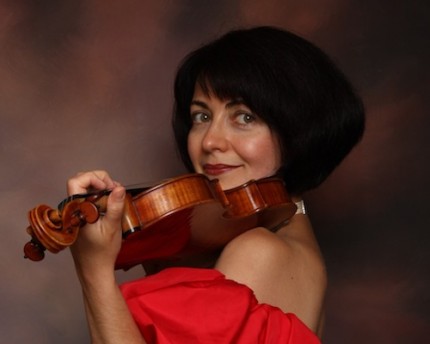The Chicago Ensemble roves, enjoyably, from Bach to Bloch

On Sunday night, the Chicago Ensemble presented its penultimate program of the season at the University of Chicago’s International House. As was to be expected from the Ensemble, the lineup was an eclectic one, featuring vocal trios and duets as well as music for solo violin and piano. Rarely do concertgoers encounter such a diverse and jam-packed recital set.
The evening’s fare progressed more or less chronologically, beginning with the posthumous madrigals of Monteverdi and ending with Jewish laments by Shostakovich and Bloch. Music director and pianist Gerald Rizzer gave thorough introductions, grounding each work in the context of its composer and era.
Monteverdi’s vocal trios “Di far sempre gioire” and “Su su su pastorelli” were animatedly brought to life by the program’s three vocalists: soprano Susan Nelson, mezzo-soprano Sarah Ponder, and tenor Hoss Brock. Both madrigals were performed with an infectious energy that also lent itself to the subsequent Purcell excerpts. Ponder and Nelson partnered for a bold and lyrical take on “Oh the sweet delights of love,” and Brock’s tender phrasing in “Sweeter than roses” proved true to the aria’s title. The three teamed up again for the appropriately gentle and lilting “We, the spirits of the air.”
All the performers took the stage for “Ach! Wann wird die Zeit erscheinen?” from Bach’s Christmas Oratorio. The composer’s faculty for juggling multiple melodic lines was shown off to great effect: Violinist Olga Kaler contributed a robust counterpoint to the vocalists’ passionate trio, all four intertwining over Rizzer’s reliable basso continuo.
After Bach, the singers rested as Kaler returned to the stage, leading a quick jaunt through the Classical era with a spirited rendering of Mozart’s Violin Sonata in A Major, K. 305. Rizzer’s accompaniment was solid, if not quite matching his partner’s presence and gusto.
A delightful lieder episode drew the first half of the concert to a close, including Nelson and Ponder in Mendelssohn incarnations both lusty (“Ich wollt, meine Lieb ergösse sich”) and wanderlust-y (the seafaring “Wasserfahrt”) as well as two dreamy duets for soprano and tenor by Schumann (“Ich denke dein” and “Die tausend Grüsse”). Apart from a somewhat emotionally cool “Ich denke dein” from Brock and Nelson, the performances were both lively and sensitive.
The more cohesively thematic second half included Shostakovich’s From Jewish Folk Poetry and a recital arrangement of Bloch’s Baal Shem: Three Pictures of Hassidic Life. Shostakovich’s song cycle is as antithetical as, well, Shostakovich himself: The first eight songs— with titles like “Lament for the dead child” and “Song of Misery”—lead listeners through anguish after anguish, with three seemingly happy songs tacked on at the end (“A good life,” “The young girl’s song,” “Happiness”).
But even these pieces are undercut by forbidding shadows; “The young girl’s song” sounds objectively sinister, and even the Semitic modality of “Happiness” only thinly conceals what sounds like grotesque proletariat portraiture. As for the trio of singers, they pulled off the cycle with aplomb, each song beautifully dramatized in such a way that the provided English translations were hardly needed.
Kaler returned to the stage to deliver a rousing and vigorous Baal Shem as a finale; the middle-movement Nigun (Improvisation) proved a fiery, passionate show-stopper.
The program will be repeated 7:30 p.m. Tuesday at Fourth Presbyterian Church on Chestnut and Michigan. thechicagoensemble.org
Posted in Performances


